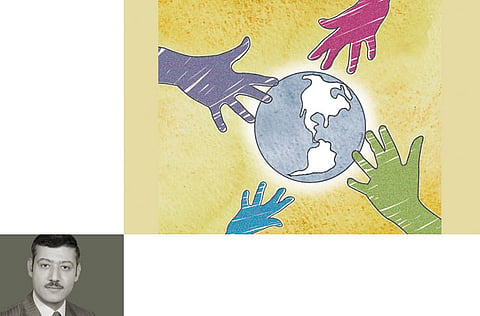A multipolar world remains a distant possibility
Major powers cannot agree on the mechanism of an alternative force to the US

As Syria descends into full-fledged civil conflict, threatening to drive the entire region into chaos and instability, the international community seems to be absolutely powerless, lacking both the will and ability to do anything other than talk to stop the bloodshed. Everybody seems to be waiting until the end of the US presidential elections to see what the new American administration would do to end the crisis.
The past 18 months of the Syrian crisis have already shown, especially to those who have always complained about the hegemonic policies of the US, that a world crisis can hardly be solved without Washington leading the efforts. Indeed, the US is reluctant to intervene in Syria, but is enjoying seeing the world begging for a more active US role.
In fact, since the end of the Cold War, the US has been trying to prevent the emergence of new competitors that would eventually challenge its position as the supreme power in the international arena. Washington has repeatedly stated that it intends to do all it can to maintain its preeminence after the collapse of its old rival: the Soviet Union. Over the past two decades, the national security strategy of the US has consistently reflected a relentless effort to ensure that no other nation could rival America’s military strength.
Reactions to the US’ gradual ascent to a hyperpower status have been predictable nonetheless: coalitions of competitors have emerged. The EU, Russia and China have tried in a persistent manner to end US hegemony and return the world to a more balanced system. The 2003 invasion of Iraq presented a golden opportunity to achieve this objective through the UN. But the UN, which managed to limp along and function adequately in more tranquil times, proved incapable of performing under periods of great stress.
Diplomatic clash
The war in Iraq exposed deep tensions between those who advocated a unipolar system and those who favoured a multipolar one. The diplomatic clash between Germany, France and Russia on the one hand and the UK, Spain and Italy on the other rendered the check of the US dominant position fruitless. More important, the disagreement between the major European powers on how to deal with the US has made it less likely that at a future point Europe could put an end to the unipolar nature of the international system.
Since the end of the Cold War, the French, and to a lesser extent the Germans, have sought to create a more balanced international system. Former French foreign minister Hubert Vedrine openly called for the establishment of a multipolar system in 1998. He said: “We cannot accept ... a politically unipolar world,” and “that is why we are fighting for a multipolar” one.
His boss, president Jacques Chirac, also battled tirelessly to create a multipolar world in which Europe becomes the counterweight to American political and military power. Chirac said: “Any community with only one dominant power is always a dangerous one and provokes reactions.”
Germany, although it joined the cause late, it nevertheless became a highly visible partner in the effort to confront American hegemony. Former foreign minister Joschka Fischer stated that the “core concept of Europe after 1945 was and still is a rejection of ... the hegemonic ambitions of individual states”. “Germany and France “share a common interest in not delivering ourselves into the hegemony of our mighty ally, the United States”, he said.
The Chinese and the Russians, two powers from outside the EU, have joined ranks and expressed solidarity with the idea of a multipolar system. The only great power, apart from the US, which did not share the others their concerns, was Britain. It positioned itself not only as an opponent of anti-Americanism, but also as a defender of US hegemony, undermining all efforts to bring about a multipolar system.
When the Libyan civil war broke out last year, France, supported by the UK this time, stepped in and tried to play a leading role in an attempt to consolidate Europe’s position as a major world power.
Consumed by the Greek financial crisis and eager to salvage the Euro, Germany did not share the French their interest and was reluctant to contribute in any major way to the war efforts in Libya. Russia and China as usual opposed Nato’s military campaign against the Gaddafi regime.
While the US did not oppose a leading European role in Libya, it nevertheless sought to teach the Europeans a lesson that without major US involvement they cannot accomplish any major military objective in the international arena.
The Syrian crisis presented another opportunity to show the world that without a leading US role, the Europeans, the Russians and the Chinese can do little to end the conflict and that the US hegemonic position remains unchallengeable.
This situation is likely to endure and the advent of a multipolar world has to wait until this picture fundamentally changes.
Dr Marwan Kabalan is the Dean of the Faculty of International Relations and Diplomacy at the University of Kalamoon, Damascus.


